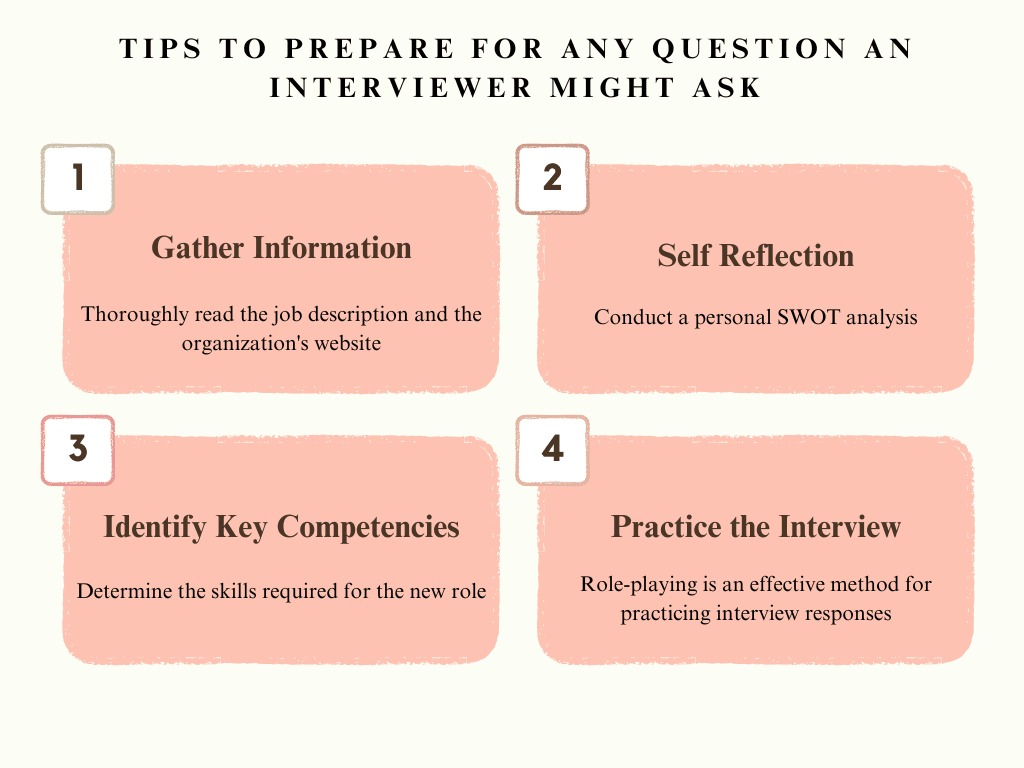Are you preparing for your next job interview and wondering how to shine? Interviews can be nerve-wracking, but they are also your chance to present yourself as the best fit. That's why understanding the ins and outs of the most common interview questions and preparing thoughtful responses to them can be the key to distinguishing yourself from others.This blog post will give you an in-depth look at seven such questions that you are likely to face, no matter your field, along with effective strategies for answering them. An updated resume and a polished cover letter might help you stand out in a pool of candidates, but it's your performance during the interview that leaves a lasting impression. Interviewers typically follow a formula aiming to understand you as a person and a worker. Thus, they often ask similar questions, giving you the opportunity to prepare in advance. So, whether it's your first interview or your hundredth, this guide will arm you with the tools you need to excel. Remember, "Preparation is Key": By practicing your answers in advance, you can avoid costly mistakes and enhance your chances of hitting the job.
However, with some practice and prep, things can be a whole lot easier. Think about unique answers to those typical interview questions instead of the generic response, which can make a huge difference. Spend some time getting to know the company and what the job entails. This sort of prep not only helps you feel more confident during the interview but also gives the hiring manager something to remember you by. The tricky questions they throw at you are more about seeing how you handle the heat, not about trying to trip you up. That's why it's essential to be well-prepared beforehand — the key to making a good first impression.
Recruiters don't pose these questions just for the sake of it - each question is devised to gain a deeper understanding of your personality and to determine if you're a suitable match for the company. Your responses to these questions play an integral role in the recruiter's ultimate decision. However, non-verbal cues like interview body language are equally crucial. Some of the most frequently asked questions in this category include:
Don't limit yourself to just discussing your work experience and qualifications. Include examples of what you enjoy doing outside of work that are relevant to the job. For example, if you're applying for a job in the technology industry, talk about how you enjoy keeping up-to-date with the latest tech gadgets and your free-time programming projects. Always keep your answers relevant to the position you are seeking. This will help provide additional context around how you will add value to the role.
Show that you have the emotional intelligence and professional acumen to effect positive change, and ensure that your reasons for pursuing the current role are well-defined and tailored to the job. The aim is to craft a compelling, truthful, and insightful response, underscoring your ability to learn and grow from past experiences.

The Importance of Job Interview Preparation
Preparing for an interview is akin to rehearsing for a big show. You're setting the stage to impress your potential bosses and other folks who might be vying for the job. It's a crucial part of the whole hiring process because it gives the interviewers a glimpse into who you are and what you could bring to the table, and it evaluates whether or not your values align with the team and the company.However, with some practice and prep, things can be a whole lot easier. Think about unique answers to those typical interview questions instead of the generic response, which can make a huge difference. Spend some time getting to know the company and what the job entails. This sort of prep not only helps you feel more confident during the interview but also gives the hiring manager something to remember you by. The tricky questions they throw at you are more about seeing how you handle the heat, not about trying to trip you up. That's why it's essential to be well-prepared beforehand — the key to making a good first impression.

Most Common HR Interview Questions
General interview questions serve a critical function for recruiters as they aim to gain more insight into you. While it may seem straightforward to anticipate common interview questions, this doesn't necessarily make them simple to respond to. Some candidates might dismiss these questions as too basic to prepare for, but this is often their biggest error: neglecting to prepare for the interview.Recruiters don't pose these questions just for the sake of it - each question is devised to gain a deeper understanding of your personality and to determine if you're a suitable match for the company. Your responses to these questions play an integral role in the recruiter's ultimate decision. However, non-verbal cues like interview body language are equally crucial. Some of the most frequently asked questions in this category include:
Question 1: "Tell Me About Yourself"
When the interviewer asks, "Tell me about yourself," they are looking for a brief but compelling overview of who you are professionally, not personally. Your response sets the tone for the entire interview. A beneficial approach is to discuss your present, past, and future. Start by summarizing your current position, then elaborate on the skills you've gained from previous roles. Finally, explain how this new job is your ideal next step. If possible, include one or two specific, measurable achievements to demonstrate your suitability for this role. Show your confidence and enthusiasm from the beginning. This question is a golden opportunity to sell yourself and explain why you're the right candidate for the job. Keep it brief and stick to the most important points, starting with your most recent role. Focus on your most recent activities and why you're applying for this particular role.Don't limit yourself to just discussing your work experience and qualifications. Include examples of what you enjoy doing outside of work that are relevant to the job. For example, if you're applying for a job in the technology industry, talk about how you enjoy keeping up-to-date with the latest tech gadgets and your free-time programming projects. Always keep your answers relevant to the position you are seeking. This will help provide additional context around how you will add value to the role.
Question 2: "What Are Your Weaknesses?"
When asked about your weaknesses in an interview, it's essential to approach this potentially challenging question from a growth mindset perspective. This question, often daunting for many, provides an excellent opportunity to showcase your self-awareness, positive and proactive attitude towards personal and professional development, and your ability to accept and handle feedback constructively. While revealing your weak spots might seem counter-intuitive, being honest about your areas of improvement can provide hiring managers with a comprehensive understanding of your qualifications. However, it's important not to appear overly confident or resort to clichés such as "I'm a perfectionist" or "I work too hard." These responses often come across as disingenuous and can be a red flag for interviewers.It’s perfectly okay, and indeed human, to admit to having weaknesses - everyone has them. The key to answering this question effectively lies in recognizing your weaknesses and demonstrating how you're actively working to address them. For example, you might say, "I sometimes find it challenging to delegate tasks to others. However, I have been actively attending leadership workshops to improve my team management and delegation skills.” It's important to highlight your motivation to improve by sharing the steps you're taking to overcome your weaknesses. This not only shows interviewers that you're motivated to personal growth but also that your weaknesses are temporary and being actively addressed.Remember, the ultimate goal here isn’t to present yourself as the perfect candidate but rather as a mature, self-aware, and forward-thinking candidate who's continually striving for improvement, committed to learning and positively driven to overcome any obstacles that may come your way.Question 3: "What Are Your Strengths?"
Discussing your strengths in an interview can sometimes feel challenging, with many finding it hard to articulate their skills and merits orally. However, it's crucial not to be modest during this moment. Instead, you should approach this question with a robust understanding of what the interviewer seeks to discover, and your response should be tailored accordingly. Focus on strengths that align directly with the job you're applying for. For instance, if you're interviewing for a software developer role, your strengths may include a proficient understanding of coding languages, excellent problem-solving abilities, and a keen eye for detail, enabling you to debug effectively.Remember, this is your time to shine; don't be afraid to share your achievements. However, it's important to avoid coming across as boastful. The key is to link your strengths with the critical qualities the employer seeks and provide clear examples of times you have utilized these strengths at work. Use concrete evidence from past experiences to back up your claims.Begin by brainstorming a list of your strengths - these could be skills, qualities, or attributes that make you excel at your job. Once you have this, choose one or two that are most relevant to the role you're interviewing for and provide specific, concise examples. It's essential to stay on point and avoid going off on a tangent during your interview.One common pitfall to avoid is underselling yourself. Instead of downplaying your accomplishments, let the interviewer know about them. If you've achieved something noteworthy, share it - for instance, if you led a team to a significant cost-saving solution in a previous role, be sure to mention it. Always recall to select strengths and accomplishments that are applicable to the job at hand. The ability to work under pressure is a desirable quality across many industries and is a good strength to highlight during an interview. In essence, when discussing your strengths, ensure relevancy, provide concrete examples, and don't shy away from showcasing your abilities.Question 4: "Why Did You Leave Your Last Job?"
Discussing the reasons for departure from a previous job can be a delicate topic, but it's important to approach it with honesty and professionalism. The way you speak about your prior job offers significant insight into your character. Even if you left under unfavorable circumstances, it's crucial to refrain from speaking ill of past employers. Sometimes, interviewers may provoke candidates to express negativity about their past job to assess their level of professionalism. Even if the interviewer seems sympathetic to your situation, it's best to succinctly state your reason for leaving and leave it there. It's unnecessary to delve into extensive detail. Often, individuals depart from jobs due to disagreements with company practices. Instead of criticizing the previous management, you can diplomatically express that you felt your growth was diverging from the company's direction, indicating that it wasn't a good fit without expressing negativity.If you're departing from your current role due to workplace conflicts, it's recommended to refrain from speaking negatively about the situation when discussing it with prospective employers. Prospective employers might infer that if you're eager to criticize your present company, you might behave similarly towards them in the future. Rather than expressing dissatisfaction about your previous company, inadequate pay, or lack of job fulfillment, strive to maintain an optimistic attitude.If you're leaving your previous position in pursuit of a better pay scale, consider framing it as a search for a role with increased responsibilities, signaling your readiness to step up. The most appealing candidates are those who can articulate valid reasons for leaving their past jobs without resorting to negativity or disparaging their former employer. Even in situations where your previous employer was responsible for the termination of your employment, it's crucial to maintain a positive outlook. The objective of the interviewers is to understand your professional aspirations and principles.If you left your previous job because you needed to care for a family member or you wanted to explore a different career path, it's perfectly acceptable to be open about this. Alternatively, if you left due to burnout or a lack of work-life balance, you could express your preference for a role that promotes healthy work-life integration and values employee well-being.Show that you have the emotional intelligence and professional acumen to effect positive change, and ensure that your reasons for pursuing the current role are well-defined and tailored to the job. The aim is to craft a compelling, truthful, and insightful response, underscoring your ability to learn and grow from past experiences.
